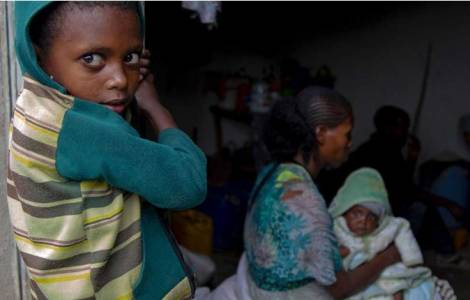
Addis Ababa (Agenzia Fides) - The slow implementation of the Permanent Cessation of Hostilities Agreement (CoHA) between the Ethiopian government and the Tigray People's Liberation Front (TPLF), signed in Pretoria on November 2, 2022, continues to fuel concern over the continued violation of human rights in the northern region of the country.
An open letter addressed to the members of the African Union is added to the rumors concerning this still very serious situation. Released by local sources, the note denounces executions of civilians, abductions of young Tigrayans, sieges, looting and destruction of property.
While appreciating the parties' strong commitment to bringing peace to the territory, the letter deplores the silence in the face of apparent violations of the agreement, including the presence of Amhara and Eritrean forces and what appears to be a systematic obstruction of humanitarian access.
Almost three months have passed (see Fides, 3/11/2022) and the main promises contained in the agreement still seem to be on stand-by. Eritrean and Amhara forces, which retain control of most areas of Tigray, continue to claim civilian casualties and loot what remains. Since the signing of the agreement, more than 3,000 civilians have been killed, according to a recent report. In addition to the reported death toll, the brutality of the attacks has resulted in hundreds of abductions, particularly of Irob and Kunama residents, minorities who face extinction. In several areas of Ethiopia, prisoners have been killed; many are still in detention centers, official or unofficial.
While the focus remains on disarming Tigrinya forces, other planned provisions seem to be neglected. These include the simultaneous withdrawal of non-Ethiopian national defense forces from the region; general security and protection of civilians; unimpeded access of humanitarian aid, including facilitation of the return and reintegration of internally displaced persons (IDPs) and refugees; restoration of essential services within the agreed timeframe; and the introduction and operation of a monitoring mechanism, to report any violations and immediate measures to be taken.
Regarding access to humanitarian aid, Tigrayans in need have received only two months of rations in the past 13 months. People living in villages far from main roads, that is the majority, are still inaccessible because distribution is mainly limited to residents or those arriving in settlements adjacent to main roads. Many of the humanitarian agencies, including those of the UN and NGOs operating in the territory, are unable to cross areas held by armed groups.
Basic services such as telephone connections still remain circumscribed, there is very little fuel and long queues to purchase the scarce supplies available. Although domestic flights have started again (see Fides, 28/12/2022).
Freedom of movement is severely restricted; road transport remains closed and Tigrayans are not allowed to leave the region. In addition, Tigray remains inaccessible to international and independent media.
Without tangible improvements, claiming that the situation is at a "point of no return", as has been suggested, is not only trivializing the suffering of millions of people, but also revealing a different situation on the ground, concludes the note sent to the AU. (AP) (Agenzia Fides, 25/1/2023)